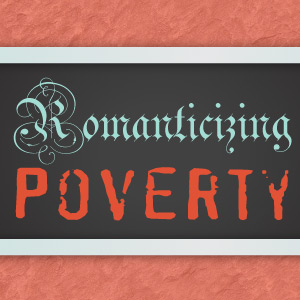“Romanticizing Poverty” Provides Legitimacy to Social Inequality

by Claire Quiney
How pop culture and Hollywood portray a working poor life as uncomplicated, void of stress, pure, and moral.
Working poor is not a lifestyle choice:
…

Source: Socialworkdegreecenter.com
Romanticizing Poverty
How pop culture portrays a working poor life as uncomplicated, void of stress, pure, and moral.
Working poor is not a lifestyle choice:
Job promotions and performance reviews[1]
Or
Simple routine and morality
We’re oversimplifying.
Movie Portrayals of Poverty:
1.)Deeply moralistic and contented:
Beasts of the Southern Wild, Slumdog Millionaire,The Son,Good Will Hunting[1]
2.)In need of assistance from a wealthy–often white–character from higher socioeconomic status:
The Help,The Soloist,The Dark Knight Rises
In pop-culture and fashion:
Bohemian: pushes aside capitalist framework and stability for what they are passionate about.[1]
Bourgeois-Bohemian: mimic the daily “simplicity of working poor, without giving up financial stability.
Dick Haynes, President and Founder, Urban Outfitters:[1]
Urban Outfitters is for the “upscale homeless.”
Nothing says homeless like the $144 “Bitching & Junkfood Algardi Velvet Swing Dress”[2]
The “live below the line” campaign challenged participants to live below Canada’s poverty line ($1.75 a day)[1]
FOR 5 DAYS…
With the knowledge they can return to overblown savings accounts.
We think of working poor as a destination. It’s exotic. But that stage wears off.
1.)Poverty shrinks your brain from chronic stress:
Long term stress shrinks the prefrontal cortex[8], insular cortex, and subgenual anterior cingulate[9] regions.[7]
All of which affect reasoning, decision making, emotions, and self-control.
So… you’re deeper in the hole.
2.)It has the highest correlations to substance abuse, broken homes, violence, and health problems
For every 1 child abused in a house making >$30,000:[5]
22 are abused in houses making <$15,000
Those with only a high school education 12% likelier to commit violent crimes.[6]
For every one child who is stunted, or in the hospital, twice as many impoverished children suffer from the same conditions.[10]
3.) Those living in poverty die earlier.
4.) And for many it never ends (it’s cyclical):
71% of children whose parents were born in the lower half of income distribution are upwardly mobile, but by much.[4]
Only 38% of people born into the lower half of income distribution make it to the upper half.[4]
Romanticizing poverty makes people think it doesn’t need to change. Don’t romanticize poverty.
Citations:
- https://medium.com/editors-picks/a29bf287ba17
- http://www.urbanoutfitters.com/urban/catalog/productdetail.jsp?id=28802635&parentid=W_APP_DRESSES
- http://www.socialsecurity.gov/policy/docs/ssb/v67n3/v67n3p1.html
- http://www.bestpsychologydegrees.org/parents-matter/
- http://www.judiciary.state.nj.us/conferences/2A-4/Protecting_Children_Article_on_Poverty_and_Neglect.pdf/
- http://www.ncbi.nlm.nih.gov/pmc/articles/PMC3015237/table/T2/#TFN3
- http://www.psychologytoday.com/blog/how-risky-is-it-really/201203/chronic-stress-can-shrink-your-brain
- http://mybrainnotes.com/amygdala-prefrontal-cortex.jpg
- http://dericbownds.net/uploaded_images/Sub_gen.gif
- http://www.princeton.edu/futureofchildren/publications/docs/07_02_03.pdf (Table 1)


